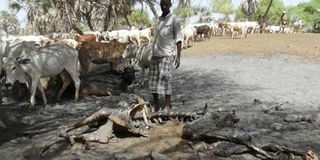Animals die as drought persists in North Horr, Marsabit County

A man stands beside the carcass of a dead cow at the Darade watering point, about 110 kilometres from North Horr Town in Marsabit County. Hundreds of animals have died while many others are emaciated following persistent drought. PHOTO | DAVID MUCHUI | NATION
What you need to know:
- A spot check by Nation.co.ke at the Darade watering point, about 110 kilometres from North Horr Town, found several carcasses near the spring.
- Animals have been converging at water points for the last one month leading to the depletion of pasture near the water sources.
- The distance from pastures to watering points is increasing by the day and more animals are getting weak and are dying on the way.
- The Pacida programme coordinator said there is need for the county government to speed up plans to construct an abattoir in Marsabit so as to increase earnings for farmers.
Hundreds of livestock have died while many others are emaciated following an ongoing drought that has led to the depletion of water and pasture in North Horr, Marsabit County.
A spot check by Nation.co.ke at Darade watering point, about 110 kilometres from North Horr Town, found several carcasses near the spring.
Speaking to Nation.co.ke, Pastoralist Community Initiative and Development Assistance (Pacida) programme coordinator Mr Wario Guyo, said that animals had been converging at water points for the past one month leading to the depletion of pasture near the water sources.
“Pastoralists are now forced to walk for up to 10 days to and from water points.
“The distance from pastures to watering points is increasing by the day and more animals are getting weak and are dying on the way. About 70 per cent of livestock is now emaciated,” Mr Wario said.
He said that the organisation and the county government are sinking a borehole at Malalba Gaal Chirro, 30 kilometres from Darade spring to ease pressure and reduce distance for the herders.
“The situation has been deteriorating because there has been no sufficient rains for three consecutive seasons. There is need for urgent interventions to cushion pastoralists from big losses,” he said.
HERDERS BURN CARCASSES
According to North Horr Ward MCA Mr Sora Guyo, the herders were forced to burn carcasses that were scattered at Darade spring to make it accessible to the livestock.
“Most of the weak animals die at the spring. For the whole of last week herders could not access the spring because of the decomposing animals,” Mr Guyo said.
Mr Isaack Jarso a herder at Darade said that he had lost about 10 goats along the way to the watering point.
“This place has been stinking because of dead animals. We sleep over four times before we can reach here to get water.
"Animals have been running away from the troughs due to the stench so we decided to burn the carcasses.
"We burnt over 50 goat, donkey and camel carcasses here,” Mr Jarso said.
He said that several of the animals have been dying after reaching the watering point while others die on the way.

An exhausted herder rests at the Darade water point in North Horr, Marsabit. Herders have been walking for as many as five days to get water. PHOTO | DAVID MUCHUI | NATION MEDIA GROUP
ANIMALS COLLAPSE AT WATERING POINT
“Some of them reach here and immediately after drinking water they collapse never to rise again. I am at loss because there is no hope for my livestock.
"My children are in school and this is where I get school fees from,” he lamented.
Mr Doko Yattani, a herder and a former chief in North Horr said that the most affected areas include Darade, Saraomo, Buluk, Keinan and Korqa.
“We laud the County government and the development partners for sinking a borehole at Malalba Gaal Chirro.
“This will ease stress on animals as it will reduce distance from pastures. We are however worried by the livestock market trends because prices are going down every day,” Mr Yattani said.
He said that transporting goats to Nairobi, their only market costs Sh700 per animal yet the prices have gone to as low as Sh1,000 per goat.
The Pacida programme coordinator said there is need for the county government to speed up plans to construct an abattoir in Marsabit so as to increase earnings for farmers.
The County government has also been urged to develop a rangeland system to control pasture use during the rainy and the dry seasons besides establishing fattening ranches.





